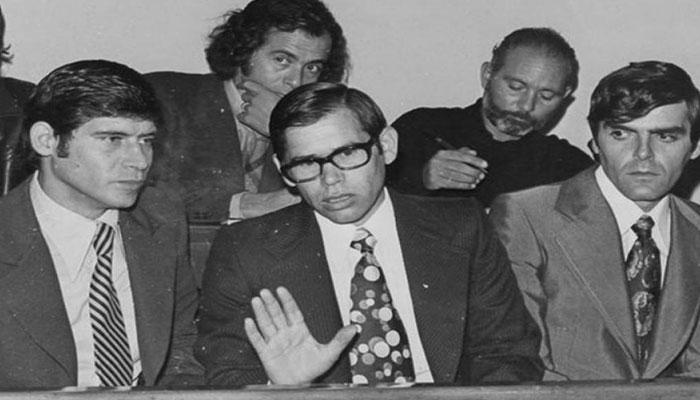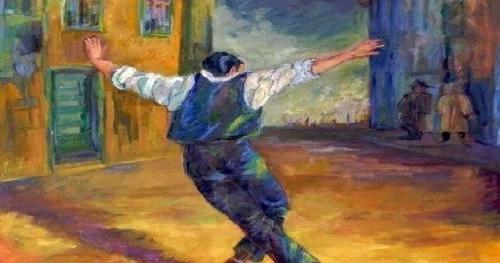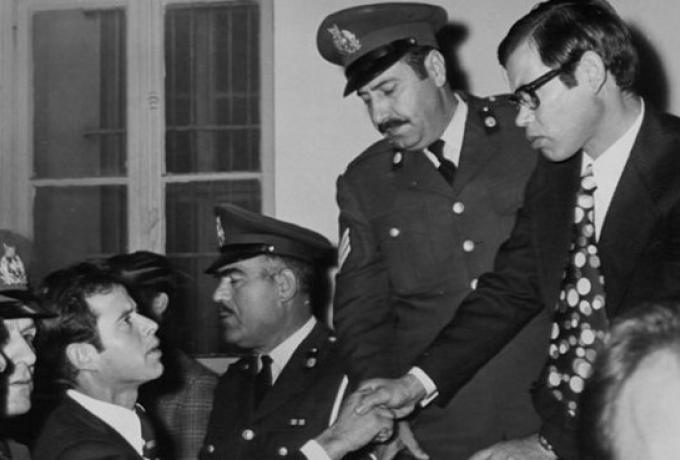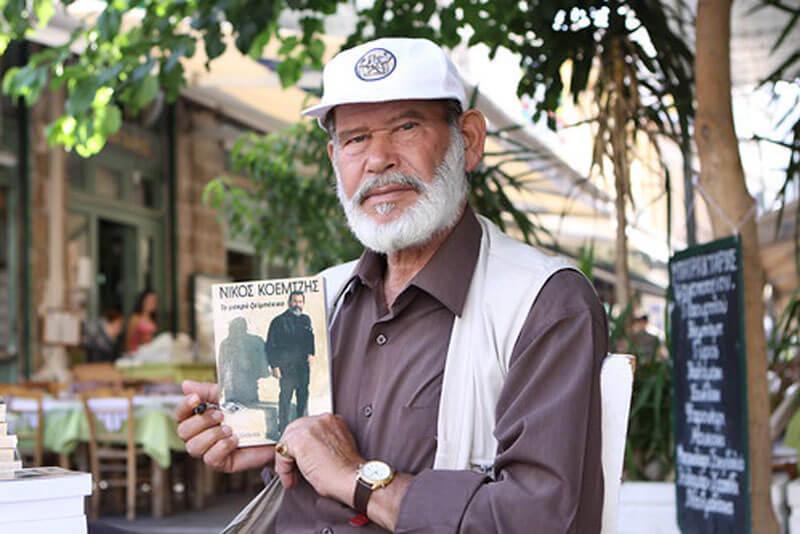
If you have been to Greece before, you’ve definitely been to a taverna. Imagine a scene like this: A man with his arms stretched out to dance and many people around him cheering him on. This is considered to be a kind of respect for the dancer in the middle.
According to Niko, no one can even try to get up to dance to someone else’s special song. Okay, it is not a specific rule, of course. It is not recorded in any law book.
But what if they do? We will talk a little bit about this.

Today I want to introduce you to one of the most notorious mafia godfathers of Greece: Nikos Koemtzis. Well, we should find a better word for him. Maybe ‘’bully’’ or ‘’rowdy’’? However, believe me, some people are calling him a ‘’HERO’’. Let’s see what you will call him in the end.
He was born in a small town called ‘’Aiginio’’ in Greece in 1938 and he spent 23 years in jail during his 73 years of life. There are many songs written about his name and his story. Actually, there is even a movie about him called ‘’Parangelia’’ which means ‘’order’’ in English.
The main story I want to share is set in 1973. However, just for you to understand the story better, you should know that Niko had some troubles such as man stabbing and extorting before this story begins. Furthermore, as you might guess, he went to jail due to being involved in these crimes. He was released in 1973 after serving four years in prison in Thessaloniki.

Later he comes back to Greece, to Athens. He soon decides to make a celebration for his freedom after four years of imprisonment. He is 35 years old and wants to enjoy life and feel the freedom that he has. Even though he is just going to a celebration, he takes his beloved knife with him which he can never leave behind. During these times the nightlife in Athens was not taking place in Kolonaki or at the seaside. It was taking place in a district called ‘’Kipseli’’. He is going to that district and entering a club called ‘’Nereida’’.
You know that there are some unwritten rules , but everyone respects them and in this story, one of these rules comes into play. If you request a song from the singer who plays in a club or a taverna and if you later shout ‘’parangelia’’ (which means ‘’order’’ in English), that means no one other than you can dance to that song.
Niko’s brother does the same. His brother asks for a song from the singer Kostas Karousakis and shouts ‘’PARANGELİA’’ and the song starts to play just for him. Niko’s brother gets on the stage and starts to dance. Since this is his song, he is the only one who can dance to it.
But everything does not go as expected. Niko’s brother starts to dance on the stage. After a while, one person comes to the stage, then another person and one more person, too. Of course, Niko does not like this situation, but at the same time he is keeping a close eye on what’s happening because it smells fishy.
And that moment comes.
Niko realizes that two of the people dancing with his brother are police. He is afraid of this situation because the police also knows that Niko is Niko. With that fear, he gets up first and shouts “Parangelia reeeeee” and then jumps onto the stage.
Niko stabs and kills two cops who behaved disrespectfully by going on stage. He stabs and injures eight people who appear in front of him. He runs away from the nightclub with his brother on February 25, 1973. Everything happens within a minute and a half. Not even a month had passed since he was released from prison… This time Niko gets into trouble again.Niko manages to escape from the police this night, taking his brother with him too. But he can’t hide for long. The security forces imprison him in Korydallos, one of the most troubled prisons in Athens. According to the military administration laws in the country, he is sentenced to three death sentences and seven life imprisonments.

After this incident, the public and the media in Greece are a little more curious about Niko’s past. That is why society is also divided into two. There are those who see him as a murderer and also some see him as a hero. It is considered possible that if someone has had experienced troubles in the past, he may tend towards violence and vandalism.
I don’t know if you have paid attention to the date, but the incident in the nightclub coincides with the years when the coup administration in Greece was dominant. 1973… times of authority and law enforcement.
Giorgos Lianis, who later became the sports minister of the PASOK party, was a reporter for TA NEA newspaper in 1978. He met Niko during his visit to Corfu prison. Later they become friends too.
Nikos tells Giorgos: My family was put under much pressure because they were members of antifascist organizations. They experienced violence. The cops used to take me into custody all the time even when I didn’t do anything. They used to keep me in a cell for 3-4 days and pour cold water on me. Now we are killing, and we are not accountable for anything.
For this reason, he was seen as a hero by the eyes of the masses who opposed the junta rule in the country.

His trial took four years after being caught. In the meantime, the junta was overthrown and the death penalty abolished. There was only one thing for Nikos to go through from then on. A whole 23 years of his life wasted in prison.
Journalist Giorgos wrote in his notebook after he visited Corfu prison:
Niko’s guilt is reprehensible. However, based on our many years of friendship, I must say that he is a very moral and honest person. We’ve been reading so many bad things about him. All the papers described him as a beast. He became the leader of the Corfu prison. After I met him in prison, he invited me to his cell. I was surprised. It was as if the cell belonged not to a person who killed 3 people within seconds, but to someone who was educated, cultured and had his own sense of justice.”
Years passed… Niko was released in 1996 after 23 years in prison. After all these years, he doesn’t know what to do or how to earn money. He has nothing to sell except for the memories he wrote down in a book in prison and he starts to sell his book. In the beginning, he gets into trouble with the police again In Monastiraki, one of the busiest squares in Athens. Since the police knows about Niko, they don’t let him sell books, but Niko is more experienced this time. He doesn’t fight. He behaves patiently and gets permission to open a bench from the Athens municipality.

His journalist friend Giorgos looks after Niko after he is released from prison. He calls him and Niko visits his office. As they talk, he realizes that over the years, Niko has become wiser, calmer and regretful about the years he has lost. He looks more mature. Niko even manages to impress all his famous friends to whom Giorgos has introduced him.
One day in Monastiraki, he meets the son of one of the people he killed that night in 1973. The son wants to attack Niko, but Niko remains calm. After 7 hours of conversation, they part but agree to meet again in peace.
September of 2011. Maybe not summer, but you know the heat of Athens… While waiting at his counter, Niko fell to the ground. An ambulance was called immediately but he wasn’t able to see the hospital. According to reports, the cause of his death at 73 was a heart attack and the heat.
One day, a knock on the door is heard and a woman comes in with a bag in her hand. It turns out that she was Nico’s partner. “When I die, I want to give this bag to my best friend,” Nico told her. The woman says, “He said that and that’s why I brought it to you.” The bag contained Niko’s personal notes, photos and poems. She gives the bag to his journalist friend Giorgos.
A hero to some and a criminal to others, Niko passed away quietly that day.
Consequently, who is Niko for us? A murderer who kills the innocent? Or is he a hero against injustice with blood on his hands?
